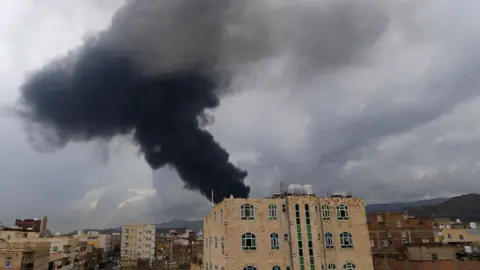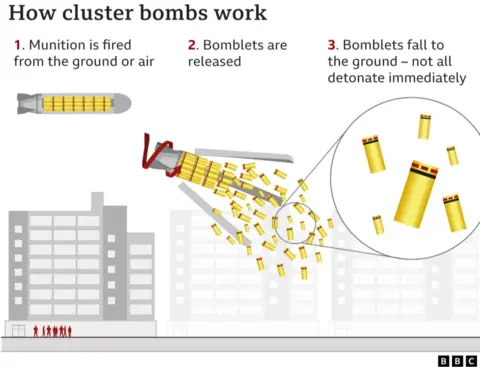AGE CONFIRMATION
18+
Verification Now
Are you 18 years or older? Please confirm to proceed.
By entering this site you agree to our Terms of Service and Privacy Policy
 MOHAMMED HUWAIS/AFP via Getty Images
MOHAMMED HUWAIS/AFP via Getty ImagesIsrael has carried out air strikes against Houthi targets in Yemen’s capital, Sanaa, in response to the group’s missile attack on Friday which the Israel military said carried cluster munitions.
The Israeli operation targeted a military complex housing the presidential palace, a fuel depot and power stations.
The Israeli military said the Houthi missile strike, which caused light damage, was the first use of such bombs by the Iran-backed Houthis during the current conflict with Israel, according to local media and the AP.
The Israeli military is reportedly investigating why it was unable to intercept the missile carrying the munitions, which are banned by more than 100 countries.
The retaliatory operation on Sanaa was overseen by Prime Minister Benjamin Netanyahu and Defence Minister Israel Katz, with the Israeli government publishing a photograph showing the prime minister at the command centre in Tel Aviv.
“Anyone who attacks us – we attack them. Anyone planning to attack us – we attack them. I believe the entire region is learning the power and determination of the State of Israel,” the prime minister said afterwards.
After Friday’s attack, the Houthis released a video showing bombs dispersing mid-air.
The Israel Defense Forces (IDF) told media on Sunday that one such bomblet had landed on the yard of a home in the central Israeli town of Ginaton, causing light damage.
The IDF investigation centres on why the missile delivering the bombs was not intercepted before they had been dispersed, according to Israeli media.
Cluster munitions are a method of dispersing large numbers of tiny bomblets from a rocket, missile or artillery shell that scatters them in mid-flight over a wide area.
They are intended to explode on impact but a significant proportion are “duds”, meaning they do not explode initially. This happens especially if they land on wet or soft ground.
They can then explode at a later date on being picked up or trodden on, killing or maiming the victim.


The Houthis have controlled much of north-western Yemen since 2014, when they ousted the internationally-recognised government from Sanaa, and sparked a devastating civil war.
Since the start of the war between Israel and Hamas in Gaza in October 2023, the Houthis have regularly launched missiles at Israel and attacked commercial ships in the Red Sea and Gulf of Aden, saying they are acting in solidarity with the Palestinians.
The rebels are supplied by Iran, which also used cluster bombs during its 12-day confrontation with Israel in June.
[ad_2]